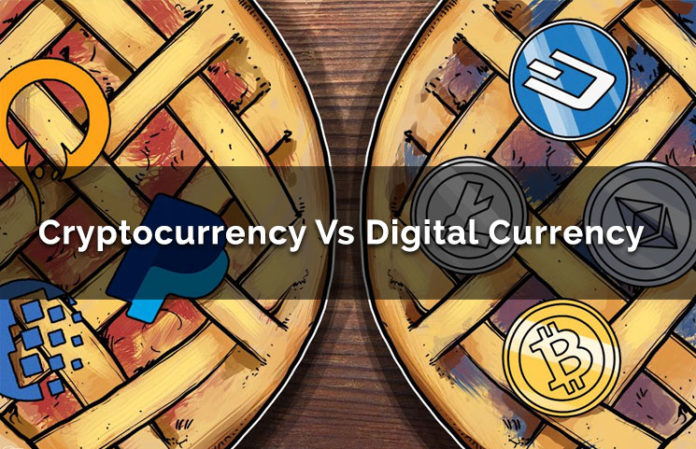Digital Currency V/S Cryptocurrency. What's Difference?
Hey Guys today I have come up with a new post on request of one of our visitor friend.
Have you ever wondered what the differences between digital currency and cryptocurrencies are? “Hold on a second”, you say… “Digital currencies and cryptocurrencies aren’t the same thing?”.
Nope, they are not! Let’s pit digital currencies vs cryptocurrencies and see who comes out on top…
Have you ever wondered what the differences between digital currency and cryptocurrencies are? “Hold on a second”, you say… “Digital currencies and cryptocurrencies aren’t the same thing?”.
Nope, they are not! Let’s pit digital currencies vs cryptocurrencies and see who comes out on top…
Digital Currency V/S Cryptocurrency.
Digital Currency Defined
According to the European Central Bank’s 2015 “Virtual currency schemes – a further analysis” report, virtual currency is a digital representation of value, not issued by a central bank, credit institution or e-money institution, which, in some circumstances, can be used as an alternative to money. In a nutshell, digital currencies are another name for money used to pay for specific goods or services on the Internet.
As you can probably imagine, digital money is entirely digital, it doesn’t have a physical equivalent in the real world. But, it acts in the same way as physical, traditional – or fiat – money. You can receive, transfer and/or exchange digital currency for another currency. It can be used to pay for goods and services, in an online store, for example, and it has no geographical or political borders.
Some argue that the lines are now becoming blurred as we move toward a cashless society, stating that physical money that is used online, for banking and retail, etc. should be classed as digital currency.
Cryptocurrencies Defined
Cryptocurrencies are a specific variant of digital currencies.
Cryptocurrencies are algorithm powered currency used as tokens in select online communities and backed by certain technologies, assets or projects. They are mostly used in peer-to-peer payments but are now increasingly used to pay for real-world goods and services.
Cryptocurrency is considered secure, reliable and trustworthy as it is based on cryptography. The art of writing or solving codes, cryptography is a mix of different sciences, with mathematics at its base.
Cryptocurrencies use Blockchain and a decentralized ledger, which means that no single individual or supervisory authority controls the actions in the network. It is pure decentralization, at its most glorious!
Digital Currencies Vs. Cryptocurrencies – The Main Differences
Though cryptocurrencies are a variant of digital currencies, there are some key differences between the two.
- Digital currencies are centralized, meaning that transaction within the network is regulated in a centralized location, like a bank. Cryptocurrencies are decentralized, and the regulations inside the network are governed by the majority of the community.
- Digital currencies are not transparent. With digital currencies, you cannot choose the address of the wallet and see all money transfers since the beginning of time. This information is kept strictly confidential and private. Cryptocurrencies are transparent. Anyone and everyone is able to see any and all transactions made and received by any user, as all revenue streams are placed in a public chain – the blockchain.
- Digital currencies have a central authority that can deal with any problems or issues. This central body can, for example, freeze or cancel transactions on the request of the participant or the authorities. Cryptocurrencies are regulated by their respective communities.
- Most countries have some legal framework surrounding digital currencies, for example, the EU’s Directive 2009/110/EC; and the US’ Article 4A of the Uniform Commercial Code.
What are the strengths and weaknesses of digital money?
Most distinctions can be considered as both advantages and disadvantages.
In a centralized system, there is a group of people responsible for the state of the whole system. If you made a mistake in a transaction, you can make a request to the company and rely on the successful outcome. You cannot do this in the decentralized system. On the other hand, centralized networks keep a lot of confidential information about the users. This data may get lost, hacked or be transferred to law enforcement agencies at court request. Decentralized networks do not have these problems. The same goes for a transaction cancellation. If the system is revocable, you can make changes to a transaction. At the same time, it opens room for fraudulent activities.
What are our views?
We team of HELPING SURFERS INC. is not only putting this article for profit it is our vision towards the cryptocurrency forward for betterment of world and new technology it our thinking is that to all people should know it. You also share this information to all. If you liked our post then please comment it will increase dedication towards resolving your problems. If you want such more information SUBSCRIBE and FOLLOW our Site Instagram page or Facebook Page.
Download our App '' Helping Surfers " to never miss any our new sorted information content. It is a kind of readily available search bar.
Search app on AMAZON APP STORE.
Or you can scan given QR code else click on given link.
App Download QR code |




